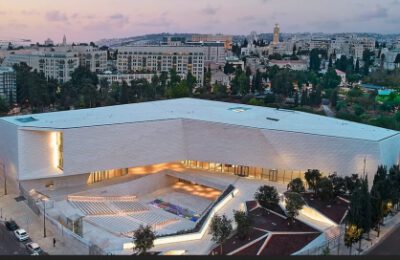By Avi Kumar
On Dec. 14, the first sub-Saharan African Jewish conference will bring together “emergent African Jews” representing approximately 10 communities.

Serge Etele, left, leads a congregation in Cameroon of around 100 members, including Viany Abia, right. They are pictured at the community’s farm.
The conference-taking place in Ivory Coast, West Africa, is being organized by Kulanu, a New York-based nonprofit that helps various groups abroad connect with Judaism.
“We are talking about emerging Jewish communities. This is an astounding concept and completely below the Jewish radar,” said Rabbi Dr. Ari Greenspan, a Kulanu volunteer.
“No, we are not talking about expat Ashkenazi and Sephardic communities in big cities like Nairobi or Cape Town. There are so many different groups in Africa associated with Judaism and the Jewish people.
“Ethiopian Jews are originally Jewish and widely accepted as being so,” he said. “The communities in Tanzania and Zimbabwe originate from a Yemenite background. Others say they are non-Jews who converted such as the Abayudaya [Luganda for ‘People of Judah’] in Uganda. The Igbo in Nigeria, meanwhile, say that they come from the ‘lost tribes.’
“In terms of numbers, there are smaller communities, such as those in Madagascar, Kenya, Ivory Coast and Ghana, with probably 100 members or less.
“Some have a few thousand, like the Ugandan Jews, and some count tens of thousands like the Lemba in Zimbabwe.
“The Igbo tribe has over 30 million people. While most Igbo today are Christian, they believe with all their heart that they originate from the tribe of Gad; they had an ancient king called Eri and Gad had a son named Eri.
“Amongst them today, there is a small number who are now practicing Judaism in the most stringent manner, keeping the Shabbat and they even have a few active synagogues.”
Madagascar, explained the rabbi, has a distinct community. “They shifted from Catholicism to Protestantism, transitioning from an ‘evangelical approach’ to a ‘biblical approach,’ and they eventually found that Judaism answered their search and so, this is what they ultimately drifted toward,” Greenspan said.
Rabbanit Bonita Nathan Sussman, president of Kulanu, said, “Setting up a sub-Saharan African Jewish alliance like this is unprecedented. They will spend Shabbat together, meet up and discuss how to share their successes and challenges to move forward as a united African Jewish community.”
Greenspan, a dentist, has traveled widely across the continent. He is one of the few people who has visited most of these communities and has a firsthand picture of emergent Jewish life in Africa.
Serge Etele, leader of a Cameroon congregation of around 100 members, said, “We are very isolated and it is important for us to foster connections such as this.
“Most African Jewish communities are scattered and therefore it is amazing that we are able to come together.
“Some issues our community faces are difficulties getting Judaica items like Torahs, mezuzzot, matzah on Passover, Hebrew books and other Jewish learning material.
“For now, when it comes to meat, we can slaughter our own kosher chicken and get fish. But beef and lamb aren’t available, neither is kosher wine. Hopefully in future, thanks to initiatives such as this, we can assist each other to overcome these challenges and grow in our Judaism,” Etele said.
Ethiopian Jews are the only ethnic group from sub-Saharan Africa that is eligible to migrate to Israel under the Law of Return.
Greenspan said that Kulanu is non-denominational and non-political. “Our goal is to help these distant communities to find themselves. We also provide educational and financial support whenever we can,” Greenspan said.
Uganda-based Rabbi Gershom Sizomu serves the Abayudaya and is the first locally born black rabbi in sub-Saharan Africa.
“I am very excited about this upcoming event. We will have a workshop on shechita [kosher slaughter]. There will also be a display of African music,” he said.
Hillary Zhou from Zimbabwe added, “For me, this milestone is a sign of the gathering from all the four corners of the world of the dispersed people of Am Yisrael.
“I have in my heart a great feeling knowing that we are not alone as we strive to expand our family ties.”
















